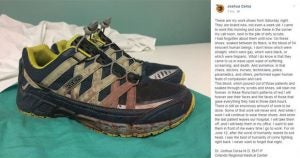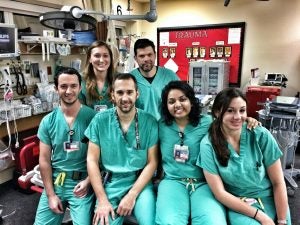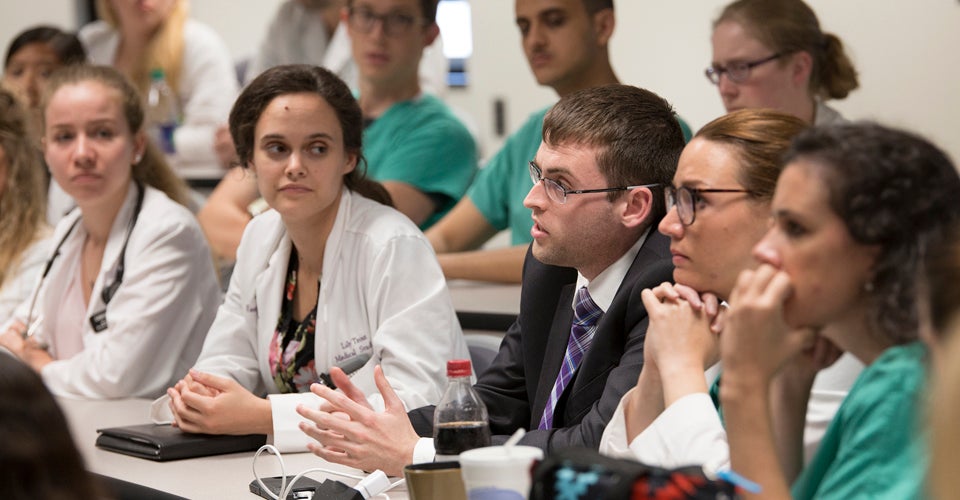TRAUMA AND HEALING
Alumnus tells Brody students about treating Orlando victims
Dr. Josh Corsa had just sat down and taken off his shoes for a short break after an already busy night at Orlando Regional Medical Center when he received a text from a colleague: “active shooter downtown.”
He knew it was unusual to receive a text before a trauma alert on his pager, but he didn’t know he – and his shoes – were about to become part of the recovery after the worst mass shooting in U.S. history.
Corsa, a 2012 graduate of the Brody School of Medicine at East Carolina University, returned to campus July 22 to share his experience with medical students. As a senior resident in surgery, Corsa helped treat 44 wounded after a gunman attacked Pulse, a popular gay nightclub, in the early hours of Sunday, June 12. Fifty people were killed at the scene, including the gunman.
Corsa’s shoes, covered in the mingled blood of the victims he and his team treated, became a national symbol of both loss and unity after a photo he later posted to Facebook went viral, with hundreds of thousands of shares.

Corsa’s viral Facebook post
“I’m nothing special, I’m just the sucker that was on call that night,” Corsa told the third- and fourth-year medical students. “That Saturday was a busy day. Five or six shootings in a night is normal. So we’re used to that, but you’re never prepared for something like this.”
As for the Facebook post going viral, “that was unintentional to say the least,” Corsa said.
Corsa told students not only how patients were triaged and treated, but also how the medical team worked together under highly unusual circumstances, and how they’re still dealing with the aftermath.
This shooting is unique in American history, according to Corsa, because the night club is only about half a mile from the hospital, and victims were arriving on foot or by car without warning, instead of by ambulance.
“After the first couple, I looked up and saw four more coming in,” Corsa recalled. “Then 10 more, then 20 more. They were coming in by the truckload.”
Medical staff performed a total of 71 surgeries. Nine people died in the trauma center. Despite the chaos, everyone stepped up, Corsa said.
“As an intern, you might think you can’t make a difference, but you can. Read and study everything you can,” he told students. “Even if it’s not your duty, be ready to do whatever is needed.”
This was not Corsa’s first time dealing with mass casualties; he spent five years in the Army after high school.
“In a way I’m glad it was me, because of my previous experience with this kind of thing,” he said. “It was the ‘best worst’ night of my professional career so far.”
After a 38-hour shift, Corsa went home and tossed his scrubs and shoes in a corner and didn’t think about them much until the next day. That’s when the enormity of it all hit him, prompting him to post the picture and a message in tribute to the victims. While some commentators accused him of exploiting the tragedy, he said the response to his post has been overwhelmingly positive.
“The last thing I want is to use this for personal gain,” he said. “I was a bit part of the whole thing.”
Nearing tears at points during his talk, Corsa told students he was still figuring out how to move on.
“Part of surgery is knowing when to say no, when someone can’t be saved. You’ve got to remain detached. Logically you know it’s the right decision, but emotionally it’s totally different,” he said. “It’s hard to find someone outside your close colleagues to understand what it’s like. Look to your friends and fellow faculty members.”
Corsa said he will always remember those he treated, and how they treated him. One man, who was shot four times and saw his friend die, kept asking him, ‘Hey doc, how are you doing, are you sleeping?’”
“Caring for them is what kept me going,” he said.

Corsa, front and second from left, with the team that treated the Orlando shooting victims, about a week after the event. (Contributed photo)
Students asked Corsa if the shooting made him question staying in trauma surgery.
“I did question it,” he responded. “Every specialty will have terrible days. We saved a lot of lives as a team. I’m proud of the work we did.”
Third-year medical student Wooten Jones of Wilmington said he appreciated hearing Corsa’s story.
“I think he encapsulated the notion of service above self,” Jones said. “He was back at work the next Monday. I learned that we should be prepared as much as possible, and have the mindset to be ready for anything.”
Corsa credited East Carolina’s community involvement with helping to prepare him for his residency in Orlando.
“We’re a community. I’ve gone to Pulse multiple times. It’s a fun place to go,” he said. “Developing a rapport with the people of your community is very important.”
Originally from Massachusetts, Corsa’s family moved to Kill Devil Hills when he was 15, and he went to Western Carolina for his undergraduate degree. Corsa came to ECU with a plan to study emergency medicine, since he had worked in EMS in high school. But he quickly found his calling in trauma surgery.
“First I have to thank the trauma faculty here,” Corsa said. “I shadowed one, and never looked back. They really taught me a lot, and cared about their students and patients. Without them, I would’ve been in a different specialty. Going to a medical school that emphasizes primary care was really valuable. I learned about things outside of surgery. ECU did a good job grounding me.”

Fourth-year medical student Kevin Harris, center, asks a question after Corsa’s talk.